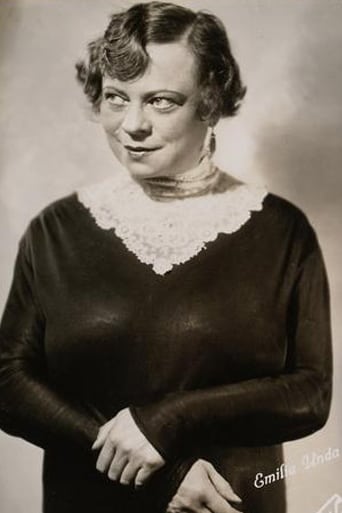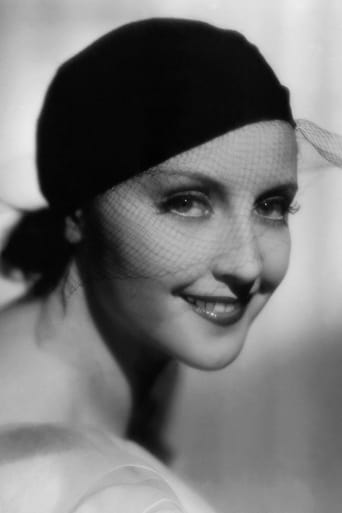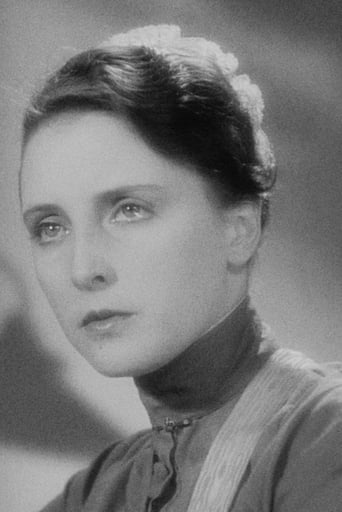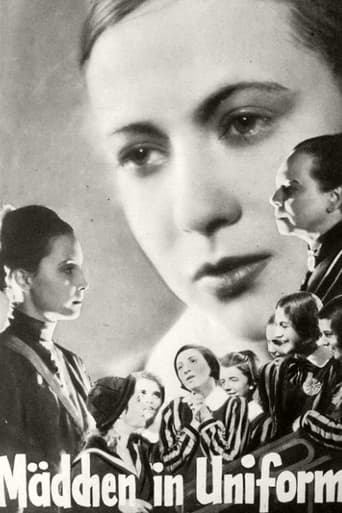
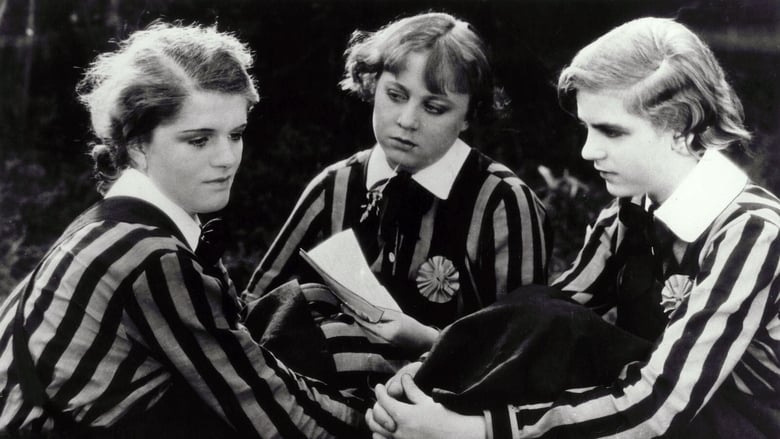
Mädchen in Uniform (1932)
A sensitive girl is sent to an all-girls boarding school and develops a romantic attachment to one of her teachers.
Watch Trailer
Cast


Similar titles
Reviews
It's technologically pretty clever for 1931. Near the opening, just when the new girl is being shown around the boarding school, there is a scene of the girls' chorus enthusiastically singing a patriotic song, and the camera dollies in through the mob to one particular face. As it does so, the sound of her voice becomes louder and distinguishable from the others, so we can hear that she's shouting a corruption of the lyrics -- something about needing to eat.The careful meshing of images and sound wasn't standard for the time, except of course that Hitchcock had played around with it in early films like "Blackmail". But it's apparent that some effort was put into the direction. There's a nicely staged high angle shot of a five-story square staircase filled with chattering children moving upward as if on a frisky escalator.The new girl is fourteen-year-old Manuela von Meinhardis, whose mother had died when she was young and father serves in the military. After the other students welcome her, they warn her about falling in love with one of the teachers, the compassionate but mercurial Fräulein von Bernburg. Manuela then is promptly groomed and fitted with an ugly uniform with precise and ergonomic Gründlichkeit.This is some girls' school too. The rules are strict, somewhere between a convent and Marine Corps boot camp. You can't have money, candy or books of your own. You can't put a picture of a movie star on the inside of your locker door. Everything is presided over by a stern, homely Headmistress who reminds me of Miss Pavor DeGrone, my fifth grade arithmetic teacher. Try to imagine a scowling Erik von Stroheim in drag. "Through discipline and hunger we shall be great again." Now, this is 1931, so Hitler hadn't risen to the dazzling heights he would yet achieve, but it's also Prussia, home of the Junkers, land of the Spartans.At bed time, von Bernburg comes around to the dormitory and kisses each girl delicately on the head. The girls, hungry for affection as well as chocolate, await their turns ecstatically. But when it's Manuela's turn she throws herself into the teacher's arms and they kiss on the lips, which introduces a note into the relationship that's only been hinted at before, although the note is minor. In a later scene, von Bernburg gives Manuela a new petticoat and the impression is conveyed that the teacher is especially fond of Manuela but that Manuela's affection goes rather deeper than that. Well, after all, Manuela is at an age where, as the headmistress puts it, "their emotions are aroused." Any doubt about Manuela's physical development is put to rest in a scene in which she wears tights as part of a costume for Schiller's play, "Don Carlos." She's pretty nicely filled out, even if she's illegal. Schiller wrote the play around 1785. I had to read his work in a German class and he's pretty good, even amusing at times. It's Schiller's words that are sung by the chorus in Beethoven's Ninth Symphony, some of the noblest music extant.During a post-play celebration, an alcoholic punch is passed around and Manuela, happy beyond imagining because she was successful as the principal player and because she believes von Bernburg loves her, gets drunk and shouts out some opinions that find their way to the ears of Miss DeGrone, I mean the headmistress. Manuela and von Bernburg are forbidden to speak to one another again and Manuela's classmates are ordered to shun her. This leaves Manuela pretty down in the dumps. I'll leave it at that.I suppose it was surprising in 1931 to find a film dealing with what everyone since appears to have called "lesbianism," but it's really a story about the need to leaven discipline with understanding and mercy. Anyway, it's not really surprising that the teen-aged girls should develop crushes on an authority figure or on each other, even if it leads to some sexual experimentation.This is the kind of school that sociologists call a total institution in which everything is controlled and people of the same sex are forced to spend time together. If this is as bad as it gets in a Prussian girls boarding school, any state prison in American has it beat by a mile.
Beautifully filmed. By turns touching, funny, and painfully sad.It is definitely a classic. A wonderful story for the gay/lesbian audience, and anti-authoritarian to anyone else who's interested. Wonderful artistic depiction of the characters.Besides, Dorothea Wieck really is hot.
Mädchen in Uniform is a very impressive German film that presents an unusual sexual awakening in an equally unusual situation, which leads to some complex content to analyze. It is clearly the presentation of a sexuality that is not considered normal, but it is not necessarily a lesbian film. I think that the fact that there is not a single man in the film and, even more, the intimate relationship between Manuela and Fräulein von Bernburg, give the impression that there is a strong lesbian undertone in the film, but I don't think that it was meant to be seen that way. It seemed to me that it was more of a coming of age film than a lesbian film. I think that Mädchen in Uniform was the portrayal of a girl who needed a higher than average amount of attention and who was reaching the age where her sexuality was beginning to take form, and because she was in an all-girl school and had no male influence in her life, she attached to the most accessible person who could fulfill those needs - Fräulein von Bernburg. It seemed to me that Manuela became so amorously attached to Fräulein von Bernburg more because of a lack of options than because of an interest in the same sex. There is undeniably a lot of female/female eroticism in the film (such as that goodnight kiss), but I don't think that it is a portrayal of lesbianism. It seems to me that the film has at least as much to say about budding sexuality and freedom of exploration for teenagers as it does about homosexuality.Manuela's needs for attention (and the same need harbored by the other girls in the film) was most directly presented in the scene where Fräulein von Bernburg comes through the room to kiss the girls goodnight one by one. In the novel Swann's Way, Marcel Proust presents a character who is so obsessed with his goodnight kiss from his mother that he literally fantasizes about it all day, and then is miserable after she kisses him because he will have to wait so long before he gets that attention from her again. He is completely dependent on that kiss, and in that gigantic novel, a large part of the reason that he is so obsessed with his mother's kiss is because he is largely isolated from the outside world an has an emotionally distant father. His only source of affectionate attention is from his mother, and it is portrayed in a way that almost seems incestuous because he loves so much to feel his mothers lips on his face. This is the same thing that is going on in Mädchen in Uniform, except in a slightly different form. Now, whether or not Mädchen in Uniform is, in fact, a lesbian film, there are definitely some typical stereotypes derailed in the close of the movie. Manuela was driven to the point of suicide by the adults at the all-girl school she attended, and it was the children who had to come in to save her (which is an element of the story that strengthens the assertion that it supports freedom for teenagers, who are clearly able to make wise decisions on their own, or at least need to be given at least a small amount of freedom and respect), and there is also the fact that she did not commit suicide, which is significant because it would have been the stereotypical way for a woman (especially a homosexual woman) to respond to a stressful situation that she cannot control.It seemed to me that in that way, the movie broke down some stereotypes, but it is important to really analyze the film so that we can see what, if any, stereotypes are applied to the characters and to the story. The sexuality in the film is obviously not traditional, but one must take into account the circumstances under which that sexuality is portrayed before one can decipher a specific message from the film.
This was more than a gay classic, this film was a social commentary on the time period it was set in. We all now well know the views held on homosexuality by Hitler's socialist party which was coming into power during the time this movie was made. The entire film foreshadowed many of the things that would happen to people who were not seen as desirable in the eyes of the German government. One part especially, where the students and teachers were forbidden to have contact with Manuela, spoke of the public shunning of Jews and other so-called undesirables who were forbidden contact with other people. Of the three movies that Leontine Sagan directed this was the only one made in Germany. Given the fact that Sagan was of Jewish ancestry and the main theme of this movie was of love between women, it's not hard to see why her career in Germany was short lived.


